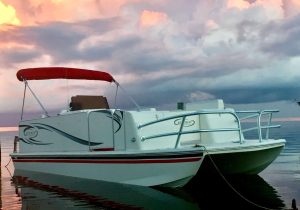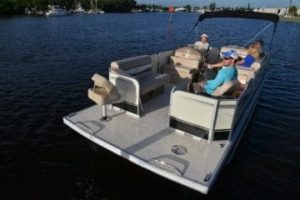Pontoon boats are mostly used in lakes and rivers, but does that mean they cannot be used in oceans. Absolutely no! With advancements in pontoon boat models, it is not a big deal. They have the versatility to cope up with the ocean saltwater. There are many pontoon boats that are branded as saltwater pontoon boats that can perform well in oceans. You can also use other pontoon boats. However, before you set out on the sail, you need to be aware of several facts. This can keep your pontoon boat safe in the ocean waves. It all depends on the construction, quality, performance and the size of the pontoon boat which takes a toll on its suitability in ocean waters. With right information you can set out on the ocean waters with your pontoon boat. Extra precaution is always good when it comes to ocean travel. Proper planning can help you out when you are in the ocean. This article will help by giving the information you need to know before take your pontoon boat into the deep blue sea. We also have some suggestions for the saltwater pontoon boats in case you make up your mind to buy one.
Myths Associated with Pontoon Boats
Most people living around the coastal areas hesitate when it comes to owning a pontoon boat. They have their second thoughts mainly because they would think of the troubles that saltwater can bring n the metal constructions. Now fiberglass boats which have resistance to saltwater have kind of overshadowed the scope of pontoon boats in the area. Another doubt which can prevent them to be a choice for ocean riding is that whether they can handle the huge ocean waves. However, with the advancement in technology, the latest pontoon boats can surpass all these misconception. They can be sailed in ocean, but keep in mind that this option is not meant for someone planning for exclusively sailing in the ocean. If you set out on the sail with pontoon boats you need to take care about a few factors. Proper maintenance before and after use of the pontoon boat in saltwater is also a must.
Pontoon Boat materials Vs Saltwater
The most common types of pontoon boats are of Aluminum, Fiberglass and Steel. Now fiberglass performs well without any rust, it is lightweight and durable. So they can indeed be used in ocean water without trouble. However, they are expensive and if by chance any need of maintenance occurs, that too will be costly. Steel is corrosive element and will rust over time when exposed to moisture and air. This is true with any steel structure and holds true in saltwater conditions too. Aluminum pontoon boats are the most common pontoon boats. Being non corrosive, they will not rust when exposed to moisture or air. However there can be galvanic corrosion with marine metals like aluminum, bronze and stainless steel.
What is galvanic corrosion?
Back in science class we have studied that when one metal in an electrically conductive solution (salt water in our case) and comes in contact with a dissimilar metal in that same solution, it will lose atoms. Losing atoms means that the metal is corroding. However, when not in contact with any other metal, these marine metals will corrode away at a reasonably slow rate and there is no danger there. Galvanic corrosion can happen when you take out your pontoon boat into the ocean. However, there are ways by which we can tackle the situation to a certain extend. These are the methods used when any marine metals are exposed to saltwater.
Before going out on the ocean, extra care should be taken to protect the pontoon boat. This may include coating the tubes with anti-fouling bottom paint. You must also rinse the hull thoroughly in fresh water after it has been exposed to salt water. Some other methods used in common is explained below.
How to avoid galvanic corrosions?
As said earlier, aluminum can do quite well when not in contact with some other metal, however, keeping safety in mind, the American Boat and Yacht Council (ABYC) recommends the aluminum vessels to have a protective paint coating which can act as a barrier between the aluminum and the water.
Sacrificial zinc anodes can be used to save aluminum products. Let us see how. When the zinc anode is electrically connected to the part (either by direct contact or by wire), the aluminum gets stuffed with excess electrons. So it actually loses those electrons rather than the aluminum giving up its own electrons. In the process zinc erodes and save the aluminum.
How many anodes and what size?
There is no formula to answer the same. It is actually a trial and error method. Let us see the ABYC procedure regarding the same.
- You need to inspect the anodes occasionally, say every month
- It is recommended to go with many small ones rather than a few large ones.
- Now the indication that you have the right number of anodes is that the anode should be about halfway gone by the end of the season, and then replaced each spring.
- If the anodes are not wearing away, then there can be several implications of the same. One is that the anode you included can be too large or it is not making good contact with the aluminum. The latter is true in most cases than the anode being too large. So zinc anodes should have cast-in plates and fasteners so as to maintain good electrical connection throughout their lives, and they should meet military spec Mil-A-18001J (or higher last letter).
Other ways to prevent galvanic corrosion
Solid keel and lifting strakes can be used along with sacrificial anodes which can prevent saltwater and marine life from settling into the boat structures and thereby corrosive buildup. Additionally, you can also use hull protection products like metal jackets which act as an extra barrier between the active metal and saltwater. If you are somebody interested in taking your pontoon boat to the ocean, you can make the choice before you buy a pontoon boat so that you could look for brands which offer salt water safe exposed metal components and invest in the same. Some manufacturers even include saltwater packages for customization so as to provide the added protection. Some of the saltwater pontoon boats are listed below:
Beachcat Saltwater Pontoon Boats
Beachcat Saltwater Pontoon Boats manufactures top-line Saltwater Pontoon Boats which are engineered to withstand the harsh saltwater conditions. They can stand up against the saltwater and offer you unparalleled comfort and luxury. Each Beachcat boat is built around the No Wood No Rot system. The material used in the construction of pontoon boats is 100% all composite materials and fiberglass. This improves the durability and the longevity of the saltwater pontoons. There are 20’, 23’ and 26’ models in the range.

Fiesta Saltwater Pontoon Boats
Fiesta Marine Products is a renowned pontoon boat builder in the USA. They have been in the industry since 1978. They offer saltwater pontoon boats with a total package of Quality, Styling, Performance, and Value. The Fiesta fiberglass saltwater pontoon boats with metal protectors are incorporated with safety and durability. They have a wide range of models to choose from. There are many options of 18’, 20’, 22’, 24’ and 26’ saltwater pontoon boats.

Godfrey Pontoon Boats with Saltwater Package
Godfrey offers various pontoon boat models to suit your various needs. There are performance-first-based models, sporty models, ultra-luxury models and many more to choose from. If you are someone planning to take the pontoon boat on an ocean ride, then they have the Saltwater customization package for providing the added protection.
What about Aluminum fuel tanks?
Now suppose the pontoon boat do not have an Aluminum body, but what if you have Aluminum fuel tanks. Brass is the most common fitting used in fuel systems. If this comes in contact with aluminum that too in saltwater medium, again you have galvanic corrosion. Stainless steel washers or adapters can be used to isolate the brass fittings from the tank. Also ensure that the tank support system is not moisture absorbent. Suitable materials for these support systems like carpeting are stiff neoprene, Teflon or any high-density plastic.
Before you decide to take your pontoon boat out into saline water, be aware of the terms of the pontoon boat manufacturer’s warranty. In some cases, they may not cover your boat for corrosion due to salt water.
Pontoon Boats Vs Big Waters
Today’s high performance pontoon boats stand a good chance against big waters and large waves. However, you should be aware about certain things before you set out on your pontoon boat.
Pontoons can be a great choice for use in inter-coastal areas, bays, rivers, and so on. Why, because the sturdier pontoons can handle the ocean, however, they may have a hard time against rough weather. So their use is usually limited to areas closer to shore. It is better if you do not go beyond 30-40 miles offshore and not further out to the sea. Make sure that you can see the shore. Also be sure that the waves are no larger than 4 feet. Setting out further into the deep blue sea and also waves larger than 4 feet can get you into trouble.
How to tackle big and rough ocean waters?
If you indeed plan to set out into the big waters beyond offshore, you can consider using a larger engine. Larger engine with higher horse power can allow you to handle the pontoon boat relatively well in ocean waters. Also, you can add a third toon to your pontoon boat. This can give more stability to the pontoon boat and will also help in creating a smoother ride.
Pontoon boats are built for fun and leisure activities and not for taking up the rough waters. They have flat deck which is great for the purpose for which it is built. But when it comes to rough, choppy waters and high waves the flat deck is not so suitable. The pontoon boats are built to glide on the water and not to cut into the waves. When waters get rough and waves become high the water can flow onto the deck. If this happens over and over, it can cause trouble. Get proper instructions beforehand. Avoid hitting the waves head on. It is better to ride into the waves by steering the pontoon boat at an angle. This makes way for the toons to ride smoothly over the crest points (maximum displacement point in the wave) with ease. Also be careful of the commercial freighters and other larger boats which can create larger wakes as they pass by.
How to Handle Rough Weather and Choppy Waters?
Rough weather and choppy water is not something under our control. Storms and lightning can all happen due to the unpredictable nature of Mother Nature. Avoiding them is the best way. Keep a check on the weather updates daily and hourly. With advancements in weather technology, there are many apps available that can help you in this. The best choice would be the National Weather Service Marine Forecast which is trustworthy.
However, if you get caught up in the bad weather, here are some things you should remember for your safety.
Storm and visibility issues
In such cases, if you loss visibility, do not panic. Put on your life jackets, turn on the lights and slow down to a safe speed. Avoid other boats. You can alert other boaters by sounding alarms. Also try avoiding shorelines and shallow areas.
Lightning
Sometimes, you may have to deal with lightning, so keep the following things in mind. In such cases, you may seek shelter if your pontoon boat has any cabin or enclosure. Be patient. Get dry if you are wet and avoid metal objects as much as possible. Avoid electromagnetic devices like mikes and radio.